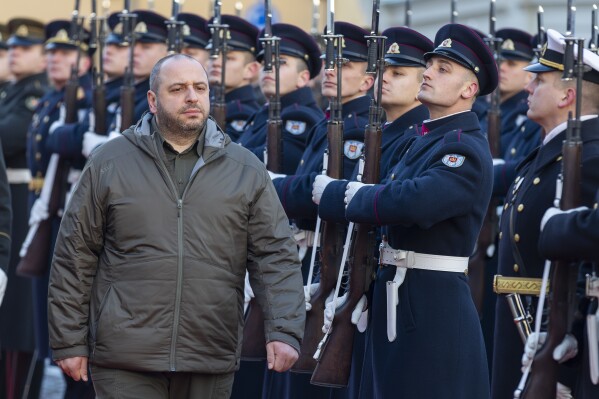KYIV, Dec 13: Last year, Ukraine’s Defence Ministry introduced a new state agency dedicated to its armed forces. This initiative was the government’s response to the widespread corruption plaguing the ministry’s procurement divisions, intended to propel reforms on the challenging road to NATO membership.
The agency, responsible for acquiring noncombat military supplies such as food, clothing, and fuel, has successfully contracted 95% of the requested supplies and saved 25% in the process, according to Arsen Zhumadilov, the CEO of the State Logistics Operator, commonly referred to as DOT. He noted that DOT will soon commence the procurement of drones.
This reform exemplifies Ukraine’s ambition to facilitate its journey towards NATO, which officials view as a crucial deterrent against Russia. Nonetheless, NATO membership remains primarily a political issue, with key nations hesitant to embrace it due to concerns about potential escalation from Moscow.
Western officials are also closely monitoring the upcoming inauguration of US President-elect Donald Trump before making definitive statements. Additionally, NATO has insisted on comprehensive anti-corruption reforms prior to Kyiv’s potential membership.
Adapting to change has proven to be a significant challenge for many within Ukraine’s post-Soviet structures.
DOT’s encouraging outcomes thus far contrast sharply with the entrenched issues still facing Defence Minister Rustem Umerov, such as slow progress in institutional restructuring and persistent corruption allegations related to lethal military procurement.
Three Western diplomats shared with The Associated Press that they are closely observing DOT’s activities. They expressed satisfaction with its results a year after its establishment, requesting anonymity to discuss their views candidly.
DOT symbolizes the complex coexistence of a digitally proficient youthful approach alongside the bureaucratic inertia typical of post-Soviet institutions. The agency’s office radiates a fresh startup culture while serving one of the country’s most traditionally rigid ministries.
This contrast highlights the nature of the war between Russia and Ukraine, where modern drone warfare coexists with World War II-style trench conflicts.
“We are aware that we are being scrutinized by NATO, the G7 countries, and all NATO member states regarding our ability to establish a procurement system that is resilient, effective, efficient, and free from corruption,” Zhumadilov remarked.
Nonlethal military acquisitions had become the center of two corruption scandals during Oleksii Reznikov’s tenure as defence minister, including cases of inflated food prices and subpar winter jackets.
Umerov, who succeeded Reznikov, described DOT as not just a new agency but the inception of a reformed public procurement system within Ukraine’s defense sector. Ukrainian President Volodymyr Zelenskyy specifically tasked Umerov with enhancing transparency in defense procurement, an area historically plagued by corruption.
Zhumadilov, a prominent public figure of Crimean Tatar heritage known for his leadership in public procurement reforms, was chosen for his proven success in overseeing Ukraine’s procurement of medical supplies.
A mood board created by the agency’s marketing team decorates the office walls, featuring a military vehicle next to a winding jungle road, a flying drone alongside a playful puppy, a Rubik’s Cube, and a designer candle. Staff members wear oversized hoodies and T-shirts, a stark contrast to the military uniforms sported by ministry officials.
In pursuit of transparency, DOT introduced DOT-Chain, an IT system designed to streamline the army’s supply requests by digitizing the entire process from application submission to invoice issuance. Developed by DOT’s IT team, it is set to reduce delivery times by up to four times and stands as the largest digital initiative within the agency. Currently focused on food supplies, Zhumadilov envisions expanding its capabilities.
However, obstacles have emerged. A planned merger with the Defense Procurement Agency, responsible for procuring lethal military supplies, was abandoned after NATO officials advised against it, casting doubt on Umerov’s decision-making.
Recognizing the long-standing corrupt practices in defense procurement, Umerov emphasized the necessity of discarding the “Soviet, oligarchic” approach to public finances.
Yet, like many aspects of the war, achieving this transformation is easier said than done.
Zhumadilov acknowledged that the agency continues to encounter resistance from ministry officials resistant to change.
“We aim to maintain openness with our colleagues at the Ministry of Defence and the Armed Forces of Ukraine, but at the same time, we are fortunate to be an autonomous agency within a broader ecosystem, allowing us to preserve our own culture,” he stated.
For instance, DOT-Chain, designed to alleviate the burdens of military paperwork, still faces opposition from bureaucrats who prefer the traditional practice of signing thousands of documents each week instead of utilizing a smartphone.
“They insist that it’s unnecessary and prefer to continue signing papers,” he said. “We counter with the fact that the volume of papers they sign weekly is simply unsustainable.” (AP)


Leave a Reply